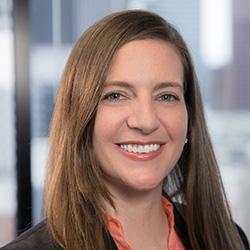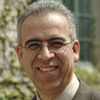Learning Lessons From Licensed Professionals
MPM’s top two leaders talk about the benefits of professional credentialing exams — and how students benefit from having two licensed leaders overseeing the program.
Shelley Finnigan was drawn to Northwestern Engineering's Master of Science in Project Management (MPM) program because of its status as a premier program to train future project managers.

That status is attributed not only to the academic expertise embodied within Northwestern University but also from the practicing professionals who bring countless years of industry leadership to their roles as adjunct faculty. The MPM program adeptly manages its connection to industry in part through the dedication of its leadership to stay current on industry trends and other developments — dedication that is not just lip service but is demonstrated through the professional credentials they proudly possess.
“The pursuit and maintenance of professional credentials is a savvy way to track your skills development after completing formal schooling and to stay attuned to developments within your industry,” Finnigan said. “And, for the leadership of the MPM program, it signals to industry collaborators that we are paying attention to things that are happening outside the walls of the university.”
 Finnigan and deputy director Ahmad Hadavi are both licensed engineers. Finnigan is a licensed structural engineer in Illinois. Hadavi is a licensed professional engineer and civil engineer in Georgia.
Finnigan and deputy director Ahmad Hadavi are both licensed engineers. Finnigan is a licensed structural engineer in Illinois. Hadavi is a licensed professional engineer and civil engineer in Georgia.
Both said that certification sends an important message to students – past, present, and future.
“It says we are professional engineers," Hadavi said, "and we teach based on sound engineering practice."
Requirements for the various licenses available to engineers vary by state. The National Council of Examiners for Engineering and Surveying (NCEES) is a nationwide nonprofit group made up of professionals from all 50 states and numerous U.S. territories designed to promote uniformity among those state regulations. It provides licensing exams and scoring, and is a central repository for all related records.
It also is a place where the industry’s top performers can connect and learn from one another.
“Our licensure gives us a hard-earned level of credibility with practicing professionals,” Finnigan said. “That’s helpful as we interact with them to learn about industry needs, improve the MPM and Master of Science in Executive Management for Design and Construction (EMDC) programs, and better prepare our students for their futures in companies that are active in projects for the built environment.”
Earning the licenses Finnigan and Hadavi carry was a test not only of what they knew about their field but also how they handled their professional lives. The exams are challenging and often are taken early in professionals’ careers.
"It is a significant load to pack into an otherwise congested phase of your life,” Finnigan said.
Despite that challenge, Finnigan and Hadavi both believe earning the licenses was a valuable step in their careers – and not always in the most obvious ways. Finnigan prepared for her exam while working at a world-renowned structural engineering design firm filled with highly skilled practitioners.
“I always found it challenging to avoid feeling intimidated by the competence of my colleagues and dubious of my own,” she said. “The most significant benefit that I gained from my licensing was a boost to my confidence.”
Both Finnigan and Hadavi said they use the lessons they learned in passing their exams to not only help their own lives but to assist the students who cross their paths. Hadavi said he’s written professional reference letters for former students seeking to join him as a licensed professional engineer.
Finnigan, meanwhile, said the act of preparing for the exam in and of itself is directly related to learning outcomes of the MPM program.
“Studying and sitting for a professional credentialing exam not only hones your technical skills, but it also serves to enhance your early-career project management skills,” she said. “Mastering the ability to manage your time, organize your thoughts and resources, and prioritize information and competing needs are all benefits that I saw from going through the process."

